重庆市初中九年级英语上期月考题目
- 格式:doc
- 大小:85.50 KB
- 文档页数:8
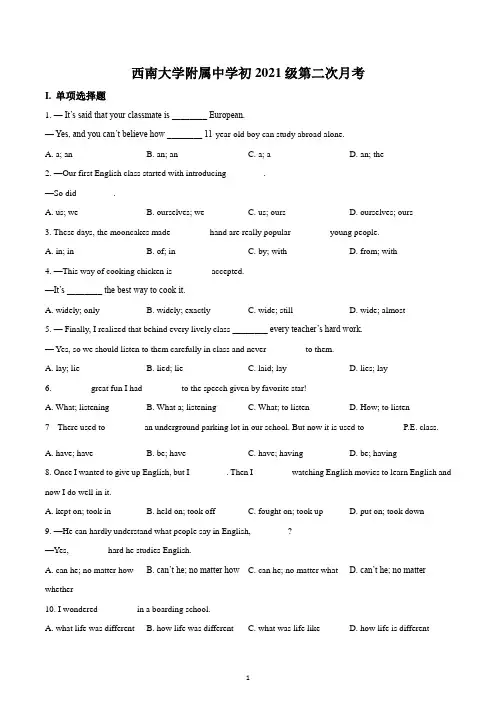
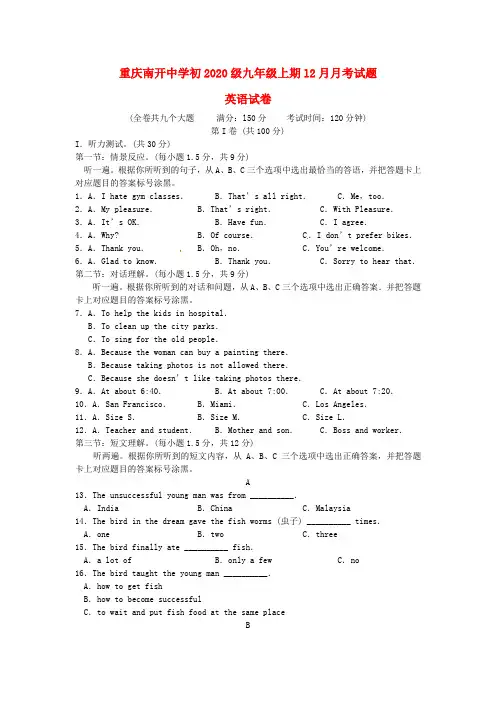
重庆南开中学初2020级九年级上期l2月月考试题英语试卷(全卷共九个大题满分:l50分考试时间:120分钟)第I卷 (共100分)I.听力测试。
(共30分)第一节:情景反应。
(每小题1.5分,共9分)听一遍。
根据你所听到的句子,从A、B、C三个选项中选出最恰当的答语,并把答题卡上对应题目的答案标号涂黑。
1.A.I hate gym classes.B.That’s all right.C.Me,too.2.A.My pleasure.B.That’s right.C.With Pleasure.3.A.It’s OK.B.Have fun.C.I agree.4.A.Why? B.Of course.C.I don’t prefer bikes.5.A.Thank you.B.Oh,no.C.You’re welcome.6.A.Glad to know.B.Thank you.C.Sorry to hear that.第二节:对话理解。
(每小题1.5分,共9分)听一遍。
根据你所听到的对话和问题,从A、B、C三个选项中选出正确答案.并把答题卡上对应题目的答案标号涂黑。
7.A.To help the kids in hospital.B.To clean up the city parks.C.To sing for the old people.8.A.Because the woman can buy a painting there.B.Because taking photos is not allowed there.C.Because she doesn’t like taking photos there.9.A.At about 6:40.B.At about 7:00.C.At about 7:20.10.A.San Francisco.B.Miami.C.Los Angeles.11.A.Size S.B.Size M.C.Size L.12.A.Teacher and student.B.Mother and son.C.Boss and worker.第三节:短文理解。
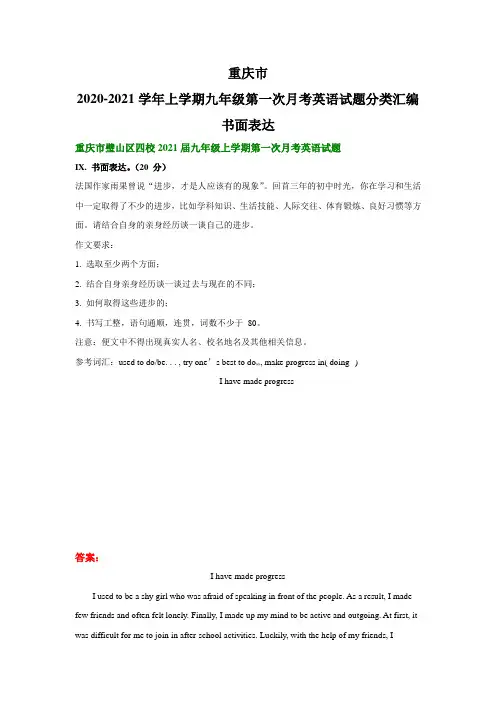
重庆市2020-2021学年上学期九年级第一次月考英语试题分类汇编书面表达重庆市璧山区四校2021届九年级上学期第一次月考英语试题IX. 书面表达。
(20 分)法国作家雨果曾说“进步,才是人应该有的现象”。
回首三年的初中时光,你在学习和生活中一定取得了不少的进步,比如学科知识、生活技能、人际交往、体育锻炼、良好习惯等方面。
请结合自身的亲身经历谈一谈自己的进步。
作文要求:1. 选取至少两个方面;2. 结合自身亲身经历谈一谈过去与现在的不同;3. 如何取得这些进步的;4. 书写工整,语句通顺,连贯,词数不少于80。
注意:便文中不得出现真实人名、校名地名及其他相关信息。
参考词汇:used to do/be. . . , try one’s best to do…, make progress in( doing )I have made progress_______________________________________________________________________________ _______________________________________________________________________________ _______________________________________________________________________________ _______________________________________________________________________________ _______________________________________________________________________________ _______________________________________________________________________________ _______________________________________________________________________________ _______________________________________________________________________________ 答案:I have made progressI used to be a shy girl who was afraid of speaking in front of the people. As a result, I made few friends and often felt lonely. Finally, I made up my mind to be active and outgoing. At first, it was difficult for me to join in after-school activities. Luckily, with the help of my friends, Imanaged to express my thoughts and helped others with their problems in my spare time. Now,I’m not a shy girl any more. I have made much progress.I used to be poor at English, especially in reading and writing. The biggest problem was that after reading a passage, I couldn’t fully understand it. This made me very sad and stressed. However, I didn’t give up. I kept on remembering new words , listening to English songs, reading English articles and writing English diaries whenever I had a chance. Little by little, I made much progress in English and also I became more and more confident.What great progress I have made!【详解】1. 题干解读:该题目是话题类书面表达,要结合题目所给信息,谈一谈自己的进步。
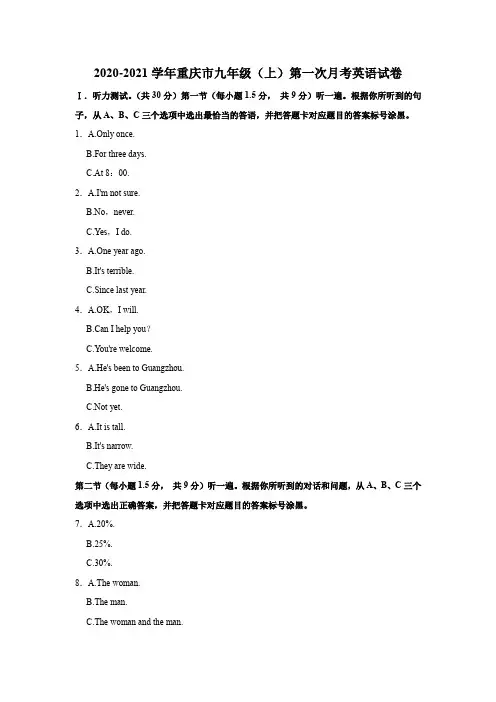
2020-2021学年重庆市九年级(上)第一次月考英语试卷Ⅰ.听力测试。
(共30分)第一节(每小题1.5分,共9分)听一遍。
根据你所听到的句子,从A、B、C三个选项中选出最恰当的答语,并把答题卡对应题目的答案标号涂黑。
1.A.Only once.B.For three days.C.At 8:00.2.A.I'm not sure.B.No,never.C.Yes,I do.3.A.One year ago.B.It's terrible.C.Since last year.4.A.OK,I will.B.Can I help you?C.You're welcome.5.A.He's been to Guangzhou.B.He's gone to Guangzhou.C.Not yet.6.A.It is tall.B.It's narrow.C.They are wide.第二节(每小题1.5分,共9分)听一遍。
根据你所听到的对话和问题,从A、B、C三个选项中选出正确答案,并把答题卡对应题目的答案标号涂黑。
7.A.20%.B.25%.C.30%.8.A.The woman.B.The man.C.The woman and the man.9.A.He gets up late today.B.His bike is broken.C.Because the traffic is bad.10.A.She played with her granny.B.She helped the disabled granny.C.She traveled to America.11.A.Two years ago.B.Next week.st Month.12.A.The population of some developing countries.B.The education of China.C.Life in the poor villages.第三节(每小题1.5分,共6分)听两遍。
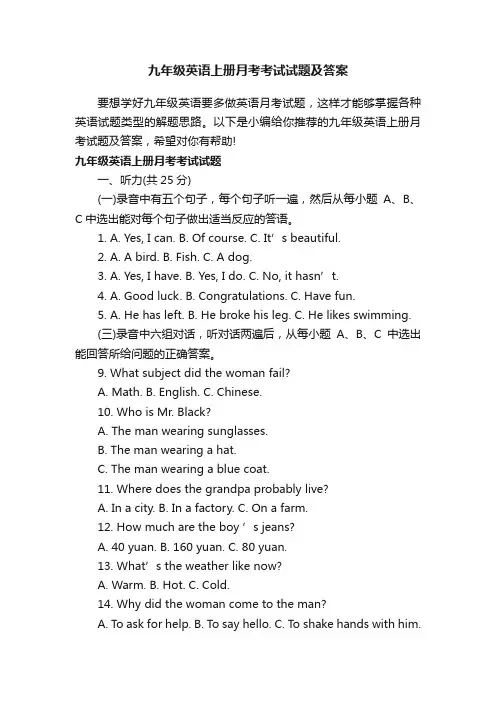
九年级英语上册月考考试试题及答案要想学好九年级英语要多做英语月考试题,这样才能够掌握各种英语试题类型的解题思路。
以下是小编给你推荐的九年级英语上册月考试题及答案,希望对你有帮助!九年级英语上册月考考试试题一、听力(共25分)(一)录音中有五个句子,每个句子听一遍,然后从每小题A、B、C中选出能对每个句子做出适当反应的答语。
1. A. Yes, I can. B. Of course. C. It’s beautiful.2. A. A bird. B. Fish. C. A dog.3. A. Yes, I have. B. Yes, I do. C. No, it hasn’t.4. A. Good luck. B. Congratulations. C. Have fun.5. A. He has left. B. He broke his leg. C. He likes swimming.(三)录音中六组对话,听对话两遍后,从每小题A、B、C中选出能回答所给问题的正确答案。
9. What subject did the woman fail?A. Math.B. English.C. Chinese.10. Who is Mr. Black?A. The man wearing sunglasses.B. The man wearing a hat.C. The man wearing a blue coat.11. Where does the grandpa probably live?A. In a city.B. In a factory.C. On a farm.12. How much are the boy ’s jeans?A. 40 yuan.B. 160 yuan.C. 80 yuan.13. What’s the weather like now?A. Warm.B. Hot.C. Cold.14. Why did the woman come to the man?A. To ask for help.B. To say hello.C. To shake hands with him.(四)录音中有两段长对话,听对话两遍后,从每小题A、B、C中选出能回答所给问题的正确答案。
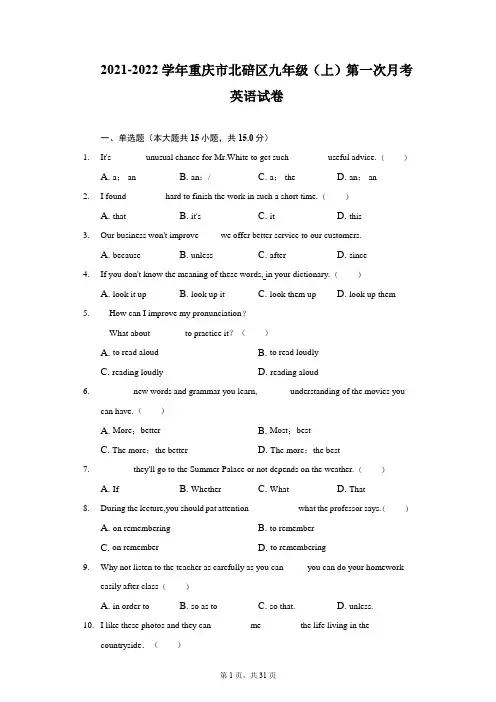
2021-2022学年重庆市北碚区九年级(上)第一次月考英语试卷一、单选题(本大题共15小题,共15.0分)1.It's _______ unusual chance for Mr.White to get such ________ useful advice.()A. a; anB. an;/C. a; theD. an; an2.I found ________ hard to finish the work in such a short time.()A. thatB. it'sC. itD. this3.Our business won't improve ____ we offer better service to our customers.A. becauseB. unlessC. afterD. since4.If you don't know the meaning of these words, in your dictionary.()A. look it upB. look up itC. look them upD. look up them5.---How can I improve my pronunciation?---What about _______ to practice it?()A. to read aloudB. to read loudlyC. reading loudlyD. reading aloud6._______ new words and grammar you learn,_______ understanding of the movies youcan have.()A. More;betterB. Most;bestC. The more;the betterD. The more;the best7._______ they'll go to the Summer Palace or not depends on the weather.()A. IfB. WhetherC. WhatD. That8.During the lecture,you should pat attention ___________what the professor says.()A. on rememberingB. to rememberC. on rememberD. to remembering9.Why not listen to the teacher as carefully as you can_____ you can do your homeworkeasily after class()A. in order toB. so as toC. so that.D. unless.10.I like these photos and they can ________ me ________ the life living in thecountryside.()A. think; ofB. remind; ofC. let; downD. wake; up11.The boy ______ on the playground ______ to me that he ______ my coat on the grass.()A. lying;lied;had laidB. lied;laying;had laidC. laid;lay;had lainD. lay;lied;has laid12.My classmate,Tom always plays a trick __________us,so most of us dislikes her.()A. onB. inC. ofD. from13.By the time the fireman arrived there,the big fire______.()A. had been put upB. had been put outC. had put offD. had put down14.He_______ with the girl with golden hair for three years and will soon getmarried_______ her.()A. has fallen in love;toB. has been in love;toC. loves;withD. loves;to15.Could you please tell me _______?()A. which the way is to the railway stationB. which was the way to railway stationC. the way to railway station is whichD. which is the way to the railway station二、完形填空(本大题共10小题,共15.0分)I don't know about your neighborhood but where I live,there seems to be a seriousmosquito invasion(侵略).We've always known mosquitoes attack us,so we do (16) possible to make sure they don't get us.To prevent them from getting into the(17),we always make sure we close the doors and windows.(18),this in itself is a challenge as people still need to come in and out of the house.So you can't keep them out(19) .Speaking of the " door" ,(20) is it really?I'm sure you know its meaning in thedictionary,but let's think about its purpose for a minute.Does a door have the ability to work on its own?No,it doesn't(21) whether it is an electric door or a normal wooden one,someone or something has to control its movement.Our lives are full of doors that only we can control.We decide when and who to enterthrough them.Look at the doors of friendship,for example.Do you know no one becomes your friend(22) your own decision?Yes,you may have(23) by chance but the decision to keep that friendship/relationship going is what you make as a person.The problem comes in when you become heartbroken,hurt and bitter,and then you realize it is the (24)door to open.Unluckily,not many people are able to close such a door after it opens and(25),they have very many mean people staying in unhealthy relationships that tire them and suck(吸吮)their blood like the mosquitoes do.If you are in such a situation,do yourself a favor and close that door to keep those "mosquitoes" away.16. A. something B. anything C. everything D. nothing17. A. body B. house C. way D. car18. A. Besides B. So C. However D. Because19. A. completely B. carefully C. finally D. especially20. A. why B. when C. who D. what21. A. happen B. matter C. work D. interest22. A. for B. in C. without D. after23. A. smiled B. met C. remembered D. reported24. A. wrong B. right C. front D. back25. A. for example B. after all C. in fact D. as a result三、补全对话(本大题共1小题,共5.0分)A:What can I do for you,sir?B:(73)______.A:Could you tell me when you would like to fly?B:On the tenth of next month.A:The tenth?Just a minute,please.I have to check the computer.Hmm,I'm sorry.(74)______,What about the ninth?B:The ninth?No,I can't leave before the tenth.What about the eleventh?A:Let me see. (75)______.B:What's the flight number?A:Flight number?It's HU703.B:HU703.(76)______.A:Yes.That's half past four in the afternoon.One-way or round-trip?B:One-way.A:How many seats,please?B:(77)______.四、阅读理解(本大题共19小题,共35.0分)AFor most western travelers,they prefer to travel alone and stay in one place for enough time to fully understand the culture.Because of this,western travelers will read moreguidebooks like Lonely Planet for information,while most Chinese tourists choose to travel in groups or with others.They may visit many scenic spots(景点)a day,listening to the tour guide.One of the most popular activities for Chinese tourists may be taking photos.For a Chinese traveler,a good camera is without doubt a must,and they like to have themselves in the photos just like Japanese and Korean travelers.However,western travelers don't care too much about the cameras or being in the photos.They care more about the experiences and beautiful views in their eyes.Chinese tourists are fans of shopping,too.They seem very happy to take out their money,spending as much as they want on big things like expensive shoes and handbags.Well,it seems that western travelers will buy those low-costreminders(纪念品)of the city and its culture.26.Lonely Planet is a ______ .A. TV showB. newspaperC. bookD. planet27.Chinese travelers would like to buy ______ .A. booksB. expensive bagsC. camerasD. low-cost reminders28.______ travelers are not interested in being in the photos.A. ChineseB. JapaneseC. KoreanD. WesternBIt's hard to talk to Dad sometimes.His silence about his feelings and thoughts made him mysterious and hard to see through.You could never break his hard shell and get to know him.And he seemed to want to stay that way too.But a year ago when my relationship with my wife and career took a hit,I needed my dad to pull back the curtain so I could see him as real and accessible.I was facing seriousproblems,and I wanted to know whether he had faced them before and how he had found his way,because I felt like I had lost mine.In desperation,it occurred to me that sending an email might be the key,so I wrote him one,telling him about my regrets and fears,and I asked him to answer,if he felt like it.Two weeks later,it showed up in my inbox:a much thought,three-page letter.Dad,a68-year-old retired technologist and grandfather of four,had carefully considered mymessage,and crafted a response.He mentioned his lost love,the foolish mistake he made in career and the stupid pride he had between him and his parents.He comforted me that "life will still find its right track despite many of its twists and turns".I closed the email and started to cry,because I wished I had opened it up earlier but wasgrateful it wasn't too late.I cried because at first,in the midst of my own struggles,his letter instantly put me at ease.And I cried because in the end,it was so simple:I just had to hit "Send".We've since had many email exchanges.This increasing communication opened a door into his world.My problems haven't been magically solved,but getting to know my dad better has made the tough stuff more manageable and life sweeter.It's hard to talk to Dad sometimes,but I'm glad I found a way to talk to mine.29.The author's dad can be best described as ______ .A. quiet and caringB. optimistic and carelessC. selfish and lonelyD. indifferent and serious30.The underlined part in Paragraph 2 can be best replaced by " ______ ".A. draw the curtainB. become more optimisticC. show his true selfD. clear the misunderstanding31.What can be a suitable title for the text?______A. Communication Is the Best Policy.B. Emails from My Dad.C. A Man of Few Words.D. My Mysterious Dad.32.Which of the following is NOT true?______A. My dad's email was quickly written.B. I was moved when reading the email.C. The email contained much information.D. I wished I could have consulted him earlier.CPeople have understood that kindness is good for the person who receives help.Forexample,when we give food to a hungry person,he is blessed.However,scientists have recently begun to study the effect kindness has on the person giving it.What they have found is that doing good is good for the doer.Acts of kindness can improve health,help a person reach goals and even add years to a person's life.The first study to show the connection between doing good and living a long life was a study on aging.Beginning in 1956,scientists studied a group of married mothers for 30 years.They thought the women with the most children would die first.But the number of children a woman had did not matter.Wealth did not cation did notmatter.What did matter was whether they volunteered.Women that volunteered had fewer diseases during their life.Many other studies have found the same positive effects.Helping other people improves long-term health.The gains are the same for men,women,old people and the young.Those who volunteered had fewer serious diseases than those who did not volunteer.Thisincluded diseases such as heart attack,cancer and stroke.Scientists are researching many possible causes.One possible cause is an increase inantibodies (抗体),which help fight against disease.One study showed the body produces more antibodies after an act of kindness.This increase in antibodies can last nearly an hour after one act of kindness is finished.Another one is an increase in a chemical that fights the effects of stress from life.Scientists have found a link between being kind to people and an increase in the chemicaloxytocin.Oxytocin is a chemical produced in the brain.It reduces many of the harmful chemicals the body produces under stress.33.What did the study in Paragraph 2 show?______A. Diseases age people fast.B. Doing good is good for one's health.C. Women with more kids die earlier.D. A long marriage leads to a long life.34.What can we infer about antibodies from Paragraph 4?______A. More antibodies may not be good.B. They help people reduce pressure.C. They increase with one's kind acts.D. The more antibodies,the more oxytocin.35.How does the author develop the last two paragraphs?______A. By explaining the causes.B. By making comparisons.C. By introducing a method.D. By describing a chemical.36.What's the main idea of the text?______A. Everyone needs to be cared for.B. Happiness is connected with kindness.C. Try your best to help someone in need.D. Helping others means helping yourself.DNot all memories are sweet.Some people spend all their lives trying to forget badexperiences.Different accidents can leave people with terrible wounds both in body and mind.Often they recall these experiences in their awful dreams.Now American researchers think they are close to developing a kind of medicine,which will help people forget bad memories.The medicine is designed to be taken soon after a scary experience.They hope it might cut down,or possibly clean up,the effect (影响)of painful memories.In November,experts tested a drug on people in the US and France.The drug stops the body releasing chemicals(释放化学物质)that make memories remain in the brain.So far the research has suggested that only the effects of memories in mind may be cut down,not that the memories are cleaned up.The research has caused a great deal of argument.Some think it is a bad idea,while otherssupport it.Supporters say it could lead to a kind of medicine that prevent or treat soldiers' troubling memories after war.They say that there are many people who suffer from terriblememories."Some memories can destroy people's lives.They come back to you when you don't want to have them in a daydream or awful dreams at night.They usually come with very painful feelings," said Roger Pitman,a professor at Harvard Medical School. "This could cutdown lots of that suffering."But those who are against the research say changing memories is very dangerous because memories make us different from others.They also help us all avoid the mistakes of the past."All of us can think of bad events in our lives that were terrible at the time but make us who we are.I'm not sure if I want to forget those feelings." said Rebecca Dresser,a medical scientist.37.The passage is mainly about ______ .A. a new medical inventionB. a way of cleaning up painful memoriesC. an introduction to how to use a kind of new medicineD. an argument about the research on a kind of new medicine38.The drug tested on people can ______ .A. prevent body producing certain chemicalsB. help people remembering bad experiencesC. cause the brain to make memories remain in the brainD. clean up the painful memories and experiences39.Which of the following does Rebecca Dresser probably agree with?______A. Some memories can make people's lives in a mess.B. Experiencing bad events makes us different from others.C. People want to get out of bad memories.D. The medicine will cut down people's sufferings from bad memories.40.Which of the following shows the structure(结构)of the passage?(1=Para.1 2=Para.2 3=Para.3 4=Para.4 5=Para.5 6=Para.6 7=Para.7 )______A. B.C. D.EColumbus was an Italian.He believed the world was round,though few people knew or believed it at thattime.He thought if he always went west,he would at last get to India.Hisfriend,Isabella,the queen of Spain, ▲ .With her help,Columbus could take the journey which changed the world and the history.On August 3rd,1492,Columbus started from Spain with three small ships.He and his men stepped into what was then an unknown sea.Many thought that they would never come back.On and on they went with their ships,not knowing where they were going!When the people of the island saw Columbus's ships,they were surprised.They had never heard of Europe,or the people who lived there.Columbus and his men filled their ships with vegetables,plants and animals.He even looks some island people with him as he returned to Spain.When the other countries of Europe heard of the great discovery of a new world,they wanted to share its riches.So many things like bananas,sugar and cotton were brought into Europe from there.And these things changed Europe a lot.potato plant which was taken hack to Europe also changed Europe.As it grew easily in Europe,it meant for the people there and so the population of Europe increased.41.In the first paragraph,which of the following sentences can be put in the ▲?______A. gave him support which made it possible for him to start his journeyB. thought this idea was too crazy and refused to support this journeyC. laughed him and thought it was impossible to finish the journeyD. agreed with him but dicing give him any support to take the journey42.In the last paragraph the writer mainly wants to tell us ______ .A. there were more foods to choose in EuropeB. the population of Europe increased very fastC. people could grow potatoes easily in EuropeD. potatoes were of great importance to Europe43.We can infer that ______ .A. after Columbus returned,some Asian countries sent out ships to the new landB. Columbus became very important in European history because of his discoveryC. when the people of the island aw ships of Columbus,they were very surprisedD. Columbus took fruits,animals and even some inland people with him as he returned44.If we put the passage into three parts,which of the following is the best?______(①= Para.1②Para.2 ③Para.3 ④Para.4 ⑤Para.5 ⑥Para.6)A. ①;②③④⑤;⑥B. ①②;③④;⑤⑥C. ①;②③④;⑤⑥D. ①②;③④⑤;⑥五、任务型阅读-简答(本大题共1小题,共9.0分)45.Liu Jichen believes good behavior(表现)should be encouraged so that it will become agood habit.The young man has succeeded in making millions of people form the habit of clearing their plates as part of the nation's efforts to cut down food waste.Liu Jichen and his team have developed a WeChat mini-program called "Clear YourPlate".After a meal,users can open the mini-program and take a picture of their empty plates.Once the picture is recognized(被识别)by the AI(人工智能),users can collect points.They can be used to buy products or give away meals to children and old people in need.Bi Haibao is a 26-year-old teacher from a college in Qingdao,Shandong Province.He was one of the program's first users before it went popular on campus(校园).He led a student team to join in a competition for the "empty plate" campaign(活动).The result is good,as many students mentioned their awareness(意识)of food saving had improved.Students who use the AI program might gradually form good habits of saving food.Liu,who believes technology can help with "Clear Your Plate",said refusing food waste should be a lifestyle choice for everyone. "We make our efforts to encourage youngpeople to save food, " he said.(1) Has Liu Jiuchen succeeded in making millions of people form good habits?______(2) What is the goal of form the habit of cleaning our plates?______(3) How did Liu Jichen and his team help people develop the habit of cleaning their plates?______(4) Do you agree whether we should form the habit of clearing our plates?Why or whynot?______六、阅读填空(本大题共1小题,共16.0分)46.Have you ever lost your car on a parking lot?It happens.You park and go shopping.Whenyou get back,you have no idea (1) your car is.It can be discouraging.You don't need to install (安装)an expensive GPS system to keep track of yourcar.That's too expensive.You would need to pay a monthly subscription fee just to useit.But is there a way to track your vehicle (2) spending a fortune?Yes,now there is!ACalifornia-based start-up company was able to make this a reality.They created a tinydevice (装置)that works with your (3) ,and it could be exactly what you're looking for!It's called TrackR Bravo.It's changing the way we keep track of the important things in our lives.Install the free TrackR app on your smartphone,connect the app to your device and you're ready to go!Simply attach TrackR to whatever you want to keep an eye on.The entireprocess of setting it up only (4) 5 minutes or less.You can attach it to your keys,wallet and anything else you don't want to lose.Then use the TrackR app to find where your missing item are in seconds.Forget expensive GPS systems or tracking services.Nobody wants to pay expensivemonthly subscription fees.We understand how stressful these things can be,and this is the reason (5) the company created TrackR.This device is your VIP when you need to take care of important things.If you forget where you park your car,take out your smartphone and open the TrackRapp.Tap on the "lost item" sign on the screen and the app will tell you the exact (6) .This device is by no means expensive.TrackR only costs $29,a small price to pay for peaceof mind.The device is small enough that you can attach it to your pets.Put it on their collar (颈圈),and you will (7) lose track of them!Attach it to your key or wallet,and never waste a minute rummaging the whole house for it.Since you've been informed(告知)about this brilliant (8) ,now attach it to everything that's important to you.(1)(2)(3)(4)(5)(6)(7)(8)七、单句语法填空(本大题共10小题,共10.0分)47.The number of the cars in Chongqing ______(increase)to about 6 million since 2019.48.Now most of English teachers are making an effort to teach their students how ______(pronounce)those difficult words.49.I'd like to give my friend a______ (create) gift. Could you give me some suggestions?50.When the students saw the doctors and nurses that fought hard in being against COVID-19come back safely,they cheered on in ______.(excite)51.My grandparents get used to walking out of their room to enjoy the ______(warm)of thesun.52.I wondered whether he ______(finish)his homework or not.53.I'm looking forward to ______ (see)you again.54.There are so many people on the train.It's______(crowd).55.Although you can't understand the ______(express)of your parents,you still respectthem first.56.On night of the Middle Autumn Day in 2019,my grandparents ______(lay)outmooncakes in the yard .八、句型转换(本大题共5小题,共5.0分)57.My younger sister has never read the novel Little Woman . (改为一般疑问句)______ your younger sister ______ read the novel Little Woman?58.It's 2 hours' bus ride from Chongqing to Chengdu. (对画线部分提问)______ ______ is it from Chongqing to Chengdu?59.Tom said to me.Have you had this house with a garden?(合并为同一句)Tom asked ______ I ______ had that house with a garden.60.请你更加关注你在考试中犯的错。
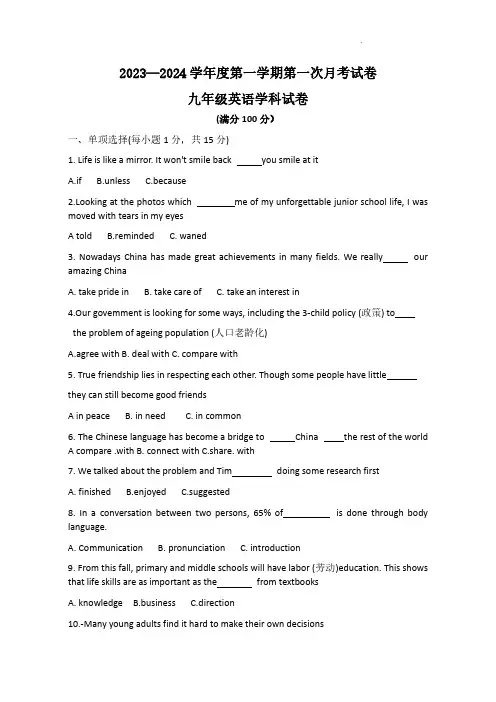
2023—2024学年度第一学期第一次月考试卷九年级英语学科试卷(满分100分)一、单项选择(每小题1分,共15分)1.Life is like a mirror.It won't smile back you smile at itA.ifB.unlessC.because2.Looking at the photos which_me of my unforgettable junior school life,I was moved with tears in my eyesA told B.reminded C.waned3.Nowadays China has made great achievements in many fields.We really our amazing ChinaA.take pride inB.take care ofC.take an interest in4.Our govemment is looking for some ways,including the3-child policy(政策)tothe problem of ageing population(人口老龄化)A.agree withB.deal withpare with5.True friendship lies in respecting each other.Though some people have littlethey can still become good friendsA in peace B.in need C.in common6.The Chinese language has become a bridge to China the rest of the worldA compare.with B.connect with C.share.with7.We talked about the problem and Tim doing some research firstA.finishedB.enjoyedC.suggested8.In a conversation between two persons,65%of is done through body language.municationB.pronunciationC.introduction9.From this fall,primary and middle schools will have labor(劳动)education.This shows that life skills are as important as the from textbooksA.knowledgeB.businessC.direction10.-Many young adults find it hard to make their own decisions—Well,they have to choose and be responsible for their actions.A.DirectlyB.quicklyC.wisely11.It's not to talk about others behind them.You can give them adviceor keep your ideas to yourselfA.politeB.scaryC.normal2pounds after the National Day holiday12--I2pounds after the National Day holiday—Don't worry.Just keep on doing sports.Selfdiscipline is extremely importantA.put upB.put offC.put on13.—I'm not sure Mike is the right person for this task—Don't worry.Time will tellA.whyB.whetherC.that14.You've drunk some wine,Remember that you mustr't drive your car,or you will beA.admiredB.connectedC.punished15.—The Internet has made communication much more—1agree For example,I can communicate with my friends on WeChat at any timeA.popularB.convenient important二、补全对话(每小题1分,共5分)(Three friends meet after school)A:Hi,boys Have you finished all the homework?B:I have just finished my English reading homework(16)A:Me,too.How long did it take?B:(17)C:Why so long?I spent only5minutesA:But the teacher always tells us not to just finish the exercises after the passage(18) B.B:Yes I drew a mind map to help understand the passageA:I wrote down my opinion about it.C:(19)I think I need to read the passage again Thank you for reminding meA:(20)B:You're welcome to share your thoughts with usA.No problemB.What about you?C.Nice to meet you.D.It secms I did so littleE.It took me nearly40minutesF Why not choose another one to read?G.We should try to think more while reading.三、完形填空(每小题1分,共10分)What will you do when you meet a problem while doing your homework?Andy would take out his smart phone,open a special app and searched the problem.21soon appear on the screenNowadays,many students do homework with the help of the Internet like Andy They search for information online,use apps or discuss through social networks like QQ and WeChat.They think it's more22than traditional learning methods Using the 23Internet also helps them find better ways to solve problems since they can also learm. how others work them outIt is true that the new method is getting more popular with the students whe have to deal with new types of homework.In order to improve students'24,some teachers now encourage their students to search for information in different ways25,more students choose the Internet and become skilled at finding information online.Some of them can26use many kinds of tools such as Microsoft Office or Photoshop to perfect theirhomework.27,many students think this trend(趋势)also causes problems.Some studeats justcopy the answers online without thinking,They become28.A head teaeher satd that it necessary for students to know29control themselves.to use the Internet properly.The key is to learmn toNo matter how difficult the problem is,think about it independenuly first.30the reasons bchind the answers,then you can make progress)21.A.Answers B.Conversations C.Novcls)22.A.polite B.inexpensive C.convenient)23.A.in B.by C.with)24A.abilities B.conditions C.patterns)25.A.For example B.As a result C.By the way)26.A.still B.just C.even)27.A.However B.Besides C.Instead)28.A.active B.relaxed zy)29.A how B.when C.where)30.A.Find out B.Look up C.Care for四、阅读理解(每小题2分,共50分)(A)请阅读下面短文,从每小题所给的A、B、C三个选项中,选出一个最佳选项。
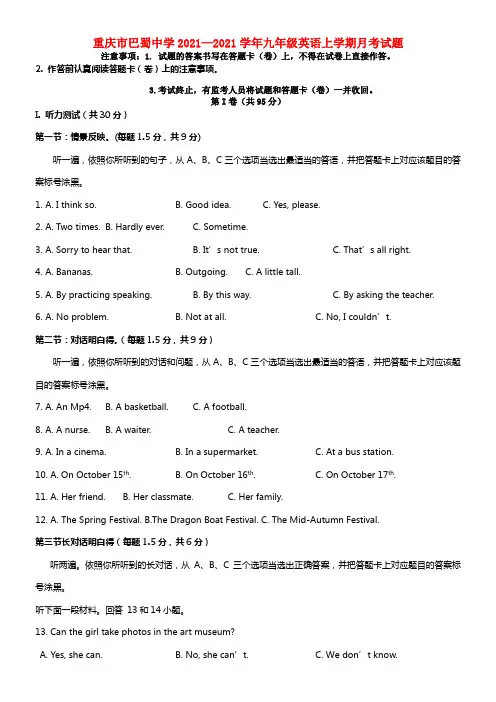
重庆市巴蜀中学2021—2021学年九年级英语上学期月考试题注意事项:1. 试题的答案书写在答题卡(卷)上,不得在试卷上直接作答。
2. 作答前认真阅读答题卡(卷)上的注意事项。
3.考试终止,有监考人员将试题和答题卡(卷)一并收回。
第I卷(共95分)I. 听力测试(共30分)第一节:情景反映。
(每题1.5分,共9分)听一遍,依照你所听到的句子,从A、B、C三个选项当选出最适当的答语,并把答题卡上对应该题目的答案标号涂黑。
1. A. I think so. B. Good idea. C. Yes, please.2. A. Two times. B. Hardly ever. C. Sometime.3. A. Sorry to hear that. B. It’s not true. C. That’s all right.4. A. Bananas. B. Outgoing. C. A little tall.5. A. By practicing speaking. B. By this way. C. By asking the teacher.6. A. No problem. B. Not at all. C. No, I couldn’t.第二节:对话明白得。
(每题1.5分,共9分)听一遍,依照你所听到的对话和问题,从A、B、C三个选项当选出最适当的答语,并把答题卡上对应该题目的答案标号涂黑。
7. A. An Mp4. B. A basketball. C. A football.8. A. A nurse. B. A waiter. C. A teacher.9. A. In a cinema. B. In a supermarket. C. At a bus station.10. A. On October 15th. B. On October 16th. C. On October 17th.11. A. Her friend. B. Her classmate. C. Her family.12. A. The Spring Festival. B.The Dragon Boat Festival. C. The Mid-Autumn Festival.第三节长对话明白得(每题1.5分,共6分)听两遍。
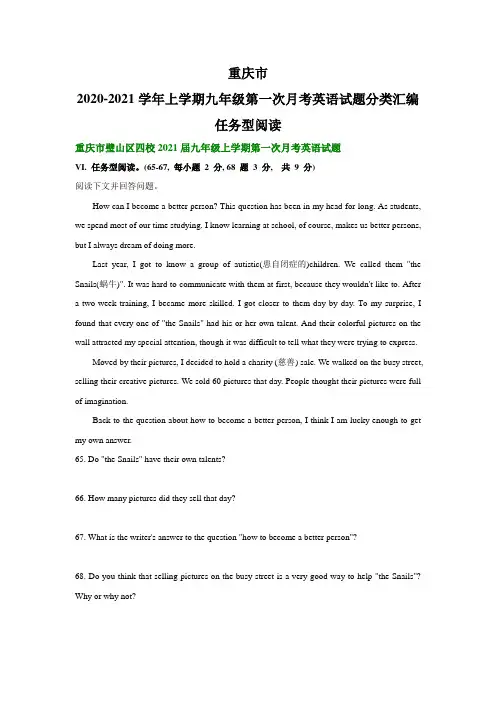
重庆市2020-2021学年上学期九年级第一次月考英语试题分类汇编任务型阅读重庆市璧山区四校2021届九年级上学期第一次月考英语试题VI. 任务型阅读。
(65-67, 每小题2 分, 68 题3 分, 共9 分)阅读下文并回答问题。
How can I become a better person? This question has been in my head for long. As students, we spend most of our time studying. I know learning at school, of course, makes us better persons, but I always dream of doing more.Last year, I got to know a group of autistic(患自闭症的)children. We called them "the Snails(蜗牛)". It was hard to communicate with them at first, because they wouldn't like to. After a two-week training, I became more skilled. I got closer to them day by day. To my surprise, I found that every one of "the Snails" had his or her own talent. And their colorful pictures on the wall attracted my special attention, though it was difficult to tell what they were trying to express.Moved by their pictures, I decided to hold a charity (慈善) sale. We walked on the busy street, selling their creative pictures. We sold 60 pictures that day. People thought their pictures were full of imagination.Back to the question about how to become a better person, I think I am lucky enough to get my own answer.65. Do "the Snails" have their own talents?_______________________________________________________________________66. How many pictures did they sell that day?______________________________________________________________________67. What is the writer's answer to the question "how to become a better person"?______________________________________________________________________68. Do you think that selling pictures on the busy street is a very good way to help "the Snails"? Why or why not?______________________________________________________________________答案:65. Yes. /Yes, they do.66. 60. /They sold 60 pictures that day.67. Studying/Learning/Working hard at school and helping others in need.68. 本题是开放性题,同意或不同意,写出合理的理由即可。
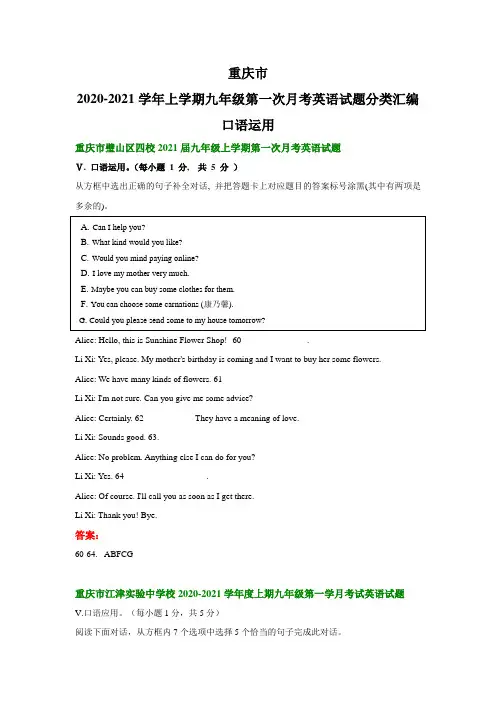
重庆市2020-2021学年上学期九年级第一次月考英语试题分类汇编口语运用重庆市璧山区四校2021届九年级上学期第一次月考英语试题Ⅴ. 口语运用。
(每小题 1 分, 共 5 分)从方框中选出正确的句子补全对话, 并把答题卡上对应题目的答案标号涂黑(其中有两项是多余的)。
Alice: Hello, this is Sunshine Flower Shop! 60_______________.Li Xi: Yes, please. My mother's birthday is coming and I want to buy her some flowers.Alice: We have many kinds of flowers. 61___________________________Li Xi: I'm not sure. Can you give me some advice?Alice: Certainly. 62 ___________ They have a meaning of love.Li Xi: Sounds good. 63.____________________Alice: No problem. Anything else I can do for you?Li Xi: Yes. 64 __________________.Alice: Of course. I'll call you as soon as I get there.Li Xi: Thank you! Bye.答案:60-64. ABFCG重庆市江津实验中学校2020-2021学年度上期九年级第一学月考试英语试题V.口语应用。
(每小题1分,共5分)阅读下面对话,从方框内7个选项中选择5个恰当的句子完成此对话。
A: Can I help you ,sir ?B: Yes . 60A: There’s a bookstore on Central Street .You can buy one there .B: Thanks .Your English is quite good .A: 61 By the way ,are you working here in Beijing ?B: No , I’m not .I’ve come for the football game this weekend .A: Oh ,so you are a player .Welcome to Beijing .B: Oh ,no .I’m not a player .I’m just a football fan .A: Me ,too ! 62B: For two weeks .I’ve visited some places of interest .A: What do you think of Beijing ?B: 63 Friendly people , delicious food and …Oh ,I just want to live in this city . A: I’m so glad you love my city .64B: Thanks .Nice to talk to you .Goodbye !A: Me ,too . Goodbye !60.61. 62. 63. 64. 答案:60-64 B F A C D重庆市万州中学初2021届九年级上期第一次月考英语试题V. 口语应用(每空1分,共5分)60B:Certainly. Go along this street. Turn left into Yimin Street, and the museum is on your right.A:61B:It's about thirty minutes.A:I see. 62B:Yes, you can. A No.4 bus will take you there.A:63B:Over there. Look! The bus is coming.A:Thank you very much.B:64答案:60-64 GDCFB重庆市实验学校2021届九年级上学期第一次月考英语试题V. 口语应用。
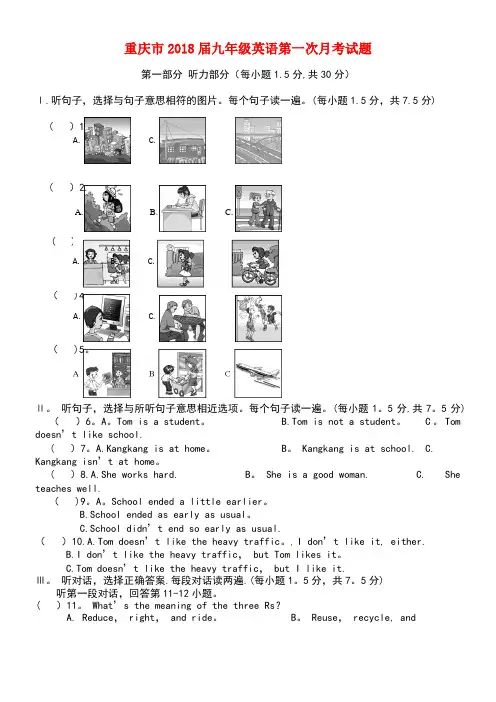
重庆市万州区岩口振兴学校2021届九年级英语上学期第一次月考试题注意:1. 全卷分为第I卷和第II卷,第I卷的答案必需用2B铅笔涂在答题卡中,第II卷的答案做在第II卷试卷上。
2.填空和写作只许诺用圆珠笔或钢笔书写,铅笔答题不计分。
第Ⅰ卷(共100分)I. 听力测试。
(每题1.5分,共30分)第一节听一遍。
( )1. A. I love the races. B. I like the mooncakes. C. Yes, I like it very much.( )2. A. Yes, that’s true. B. Sounds like fun! C. Sorry to hear that.( )3. A. What a great day! B. The vacation was boring. C. I visited my old friends.( )4. A. It was great fun. B. Me, too. C. That’s bad.( )5. A. Of course. B. No, thanks. C. Yes, they did.( )6. A. Good idea. B. Fun to watch. C. Yes, I think so.第二节听一遍。
( )7. A. A mooncake. B. Beautiful flowers. C. Some sugar.( )8. A. Tell a story. B. Share the cakes. C. Listen to a story.( )9. A. Buying a gift. B. Waiting for mum. C. Visiting Dad.( )10. A. Yes, she does. B. No, she doesn’t want to do cleaning.C. She doesn’t know what to do.( )11. A. The man didn’t like Chinese New Year.B. The man didn’t think it was Chinese New Year.C. The man wanted to tell the woman about Chinese New Year.( )12. A. People prefer old Christmas.B. It has never changed at all.C. There will be more changes.第三节听两遍。
2021-2022学年重庆育才中学九年级(上)第一次月考英语试卷Ⅱ.单项选择。
(每小题1分,共10分)从A,B,C,D四个选项中选出可以填入空白处的最佳答案,并把答题卡上对应题目的答案标号涂黑。
1.(1分)What fine weather!Let's go to the park.()A.a B.an C.the D./2.(1分)I like my new teacher,because she is always patient with .()A.we B.us C.our D.ours3.(1分)I will have a birthday party the third Saturday of November.Will you come?()A.in B.on C.at D.for4.(1分)I can't understand spoken English.Can you give me some .()A.books B.money C.advice D.suggestion 5.(1分)The more you practice,the mistakes you will make.()A.fewer B.less C.more D.most6.(1分)We didn't know that there a parents' meeting the next week.()A.is B.was C.will be D.would be7.(1分)Many years ago,Walt Disney Mickey Mouse and it has been popular since then.()A.discovered B.invented C.found D.created8.(1分)I've bought a new computer,but I don't know how .()A.using B.used C.to use D.to use it9.(1分)Let's talk about the students can use smart phones at school.()A.if B.whether C.that D.what10.(1分)﹣﹣Excuse me,could you please tell me ?﹣﹣Sure.Bus No.20 will take you there.()A.where I can get to the libraryB.how can I get to the libraryC.how I can get to the libraryD.when can I get to the libraryⅢ.完形填空。
1 重庆市初级中学九年级上期英语第一次学情调查 (Unit1-Unit3) (满分:150分;考试时间:120分钟) 第I 卷(100分) I.听力测试(共30分) 第一节:情景反应。(每小题1.5分,共9分) 听一遍。根据你所听到的句子,从A、B、C三个选项中选出最恰当的答语,并把答题卡上对应题目的答案标号涂黑。 1. A. About three years ago. B. Since I was 7. C. Five days a week.
2. A. Nice to see you. B. Happy birthday to you. C. Thank you. 3. A. What a fine day. B. Good idea. C. Here you are. 4. A. It’s doesn’t matter. B. That’s right. C. You’re welcome. 5. A. It’s 50 yuan. B. There are two dresses. C. It’s green. 6. A. No, please don’t. B. Yes, you can, if you like. C. Certainly not.
第二节:对话理解。(每小题1.5分,共9分) 听一遍。根据你所听到的对话和问题,从A、B、C三个选项中选出正确答案,并把答题卡上对应题目的答案标号涂黑。 7. A. At the railway station. B. At a bus stop. C. At the airport. 8. A. By taxi. B. By bus. C. By underground. 9. A. She will look after her mother. B. She will look after her mother and sister. C. She will look after her little sister. 10. A. 8:20 B. 8:35 C. 20:08
11. A. Go fishing B. Go boating C. Go swimming
12. A. 22 yuan B. 23 yuan C.18 yuan 第三节:短文理解。(每小题1.5分,共12分) 听两遍。根据你所听到的短文内容,从A、B、C三个选项中选出正确答案,并把答题卡上对应题目的答案标号涂黑。 A
13. How did they go to the Children’s Park ? A By bus B On foot C By car 14. How was the food in the restaurant ? A. Awful . B .Expensive C. Delicious and cheap 15. Where did they go in the afternoon ? A .A shop B.A restaurant C. A zoo 16 When did the boy go to bed ? A .At 9:00 pm B. At 10:00 pm C .At 11:00 pm
(B) 2
17. Abe Lincoln’s father was a . A. doctor B. farmer C. worker 18. Why couldn’t Abe Lincoln go to school? A. Because he didn’t like school. B. Because his family was too poor. C. Because there was no school there. 19. Most of the time on the farm Abe Lincoln was . A. unhappy B. worried. C. happy. 20. It took Mrs. Lincoln to make a trip to town.. A. five hours B. a whole day C. two hours
Ⅱ. 单项选择。(每小题1分,共20分) 1.—____ do you study for a test? — I work with my friends. A. How B. Who C. When D. Why 2. I study math by ____ lots of exercises. A. did B. doing C. do D. to do 3. —You play the piano so well. ________do you have the piano lessons? —Once a week. A. How soon B. How often C. How long D. How much 4. You should the new words that you don’t know how to spell. A. look for B. look after C. look up D. look down 5. His son is only four years old. He is ______ to go to primary school this year. A. enough old B. too old C. not old enough D. young enough 6. I think _______ the words of English songs can help us ______ . A. memorize, a lot B. memorizing, many C. memorize, a few D. memorizing, a lot 7. —Do you want to get your ears ______________ ? —No, my parents don’t allow me to do so. A pierce B piercing C to pierce D pierced 8. --- My father spends lots of time ______ with my grandmother on weekends . ---Really? He is a good son. A saying B listening C chatting D singing 9. —Don’t _______ people who are in trouble. --- I know. We should help them. A. look at B. laugh at C. talk to D. play with 10. —The teacher told me to pay more attention ____ my pronunciation. —You can practice it every day. 3
A. at B. with C. to D. for 11. Teenagers shouldn’t _____to go out every night. A. allowed B. allow C. be allowed D. be allow 12. She is terrified of the dark. She often goes to bed with her bedroom light _______. A. on B. off C. turn on D. turn off 13. ____ of the two new books are interesting. A. All B. Both C. Any D. Either 14.____ doesn’t matter if you can’t make a complete sentence. A. It B. That C. Its D. This 15. When I was a child, I used to ___________ strawberry. A. liking B. like C. liked D. likes 16. He is afraid of ___________ strangers. A. see B. seeing C. saw D. seen 17. —What are you ________ in? —That __________ story. A. interesting, interesting B. interested, interesting C. interested, interested D. interesting, interested 18. The old man is ________, but he doesn’t feel ____________. A. lonely; alone B. lonely; lonely C. alone; lonely D. alone; alone 19. ____, we found the boy won the prize. A. In surprise B. To our surprise C. To one's surprise D. To his surprise 20. --____ do you ____ with the old books? – I gave them to some children. A. What, deal B. When, do C. Why, do D. How, deal Ⅲ. 完形填空。(每小题2分,共20分) What is the best way to study? This is a very important question. Some Chinese students often __1__ very hard __2__ long hours. This is a __3__ habit(习惯),but it is not a better way to study. A good student must __4___ enough sleep, enough food and enough rest. Every _5___ you __6__ to take a walk or play basketball or ping-pang or sing a song. When you _7___to your studies, you’ll find yourself __8__than before and you’ll learn more. Perhaps we can __9___ that learning English is like taking Chinese medicine. We mean that like Chinese medicine. The effects(效果)of your study __10___slowly but surely. Learn every day and effects will come just like Chinese medicine. ( ) 1. A. play B. study C. sleep D. think ( ) 2. A. at B. in C. for D. with ( ) 3. A. best B. better C. good D. bad ( ) 4. A. have B. do C. want D. make ( ) 5. A. month B. week C. hour D. day ( ) 6. A. want B. hope C. need D. wish